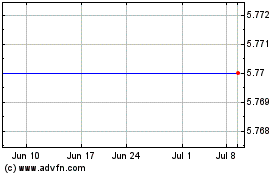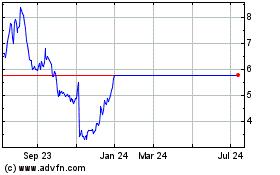Sinclair Pulls TV Signals From Dish Network
August 25 2015 - 10:20PM
Dow Jones News
Signals for one of the nation's biggest local broadcasters went
dark on satellite TV distributor Dish Network Corp. on Tuesday, the
result of a dispute over a new distribution contract.
Dish and Sinclair Broadcast Group Inc. have been negotiating a
contract that covers more than 150 local television stations owned
or managed by Sinclair that reach more than five million customers
in 79 markets. The signals were pulled from Dish after efforts to
sign a new agreement or extend the existing one failed.
Besides owning 121 TV stations, Sinclair also manages 32 through
partnerships. Of the 153 stations, 87 are affiliates of the four
major broadcast networks—CBS, NBC, ABC and Fox—meaning customers
lost access to local and national news programming as well as
sports carried by those stations.
"Despite our offer to extend negotiations without impacting our
loyal customers, Sinclair has chosen to reject the extension and
initiate the largest local channel blackout in the history of
television," Dish said on its Dish Answers Twitter account.
Sinclair General Counsel Barry Faber confirmed the broadcaster's
signals were out of Dish homes but declined further comment.
Negotiations between Dish and Sinclair got ugly two weeks ago
when the satellite broadcaster filed a complaint at the Federal
Communications Commission that accused Sinclair of failing to
negotiate in good faith on the retransmission contract.
Furthermore, Dish said Sinclair was violating FCC rules by forcing
Dish to negotiate with them for stations they don't technically
own. The two companies agreed to a short-term contract extension at
the time.
Last March, the FCC passed new rules prohibiting a broadcaster
from negotiating on behalf of a station it doesn't own but rather
operates through a so-called joint sales agreement. Many
broadcasters operate more than one station in a particular market
through such pacts. Broadcasters say it allows for cost-savings and
the ability to produce more local content. But program suppliers
and pay-TV distributors have often argued that joint sales
agreements give a local broadcaster too much leverage in contract
negotiations.
"Dish explicitly requested `Sinclair stop coordinating
negotiations or negotiating on a joint basis' for the stations in
Sinclair's proposal that Sinclair does not have de jure control
over," Dish said in its complaint two weeks ago.
Sinclair countered that it "disagrees with your legal conclusion
that we have offered to negotiate on behalf of any stations with
respect to which we do not have 'de jure' control," according to an
email from Sinclair that Dish attached to the complaint. Sinclair
said the stations in question are grandfathered from the new
regulations.
The blackout comes at a tough time for Dish, which has been
losing subscribers from consumers cutting the cord in favor of
lower-cost Internet alternatives. In its second-quarter report
earlier this month, Dish said it lost 81,000 pay-TV customers,
compared with a loss of 44,000 a year earlier.
Before the current dispute, Dish had been involved in 32 of the
74 retransmission consent disputes that have resulted in TV
blackouts since January 2012, according to the National Association
of Broadcasters.
Sinclair, in an earnings call earlier this month, noted that the
retransmission rights for 75% of its subscriber base were up for
renewal over the next 12 months, giving the company an opportunity
to reset the fees it receives under those deals.
Write to Joe Flint at joe.flint@wsj.com
Access Investor Kit for "Sinclair Broadcast Group, Inc."
Visit
http://www.companyspotlight.com/partner?cp_code=P479&isin=US8292261091
Subscribe to WSJ: http://online.wsj.com?mod=djnwires
(END) Dow Jones Newswires
August 25, 2015 22:05 ET (02:05 GMT)
Copyright (c) 2015 Dow Jones & Company, Inc.
DISH Network (NASDAQ:DISH)
Historical Stock Chart
From Mar 2024 to Apr 2024

DISH Network (NASDAQ:DISH)
Historical Stock Chart
From Apr 2023 to Apr 2024
